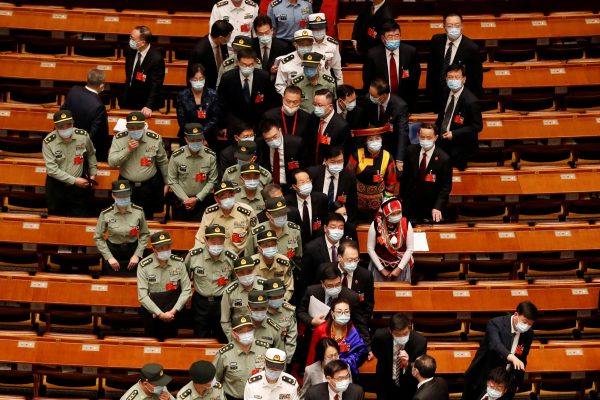The NPC is frequently labelled a rubber stamp parliament in the West, but its role and interaction with the Chinese Communist Party (CCP) and the CPPCC are more nuanced — the outcomes from this year’s plenary sessions reflect the sophisticated operation of party-state constitutional machine and increasing nationalist forces in the Chinese selectorate.
In this year’s session, the NPC passed a number of notable laws including the National Civil Law and a controversial new national security bill aimed at curbing continued protests in Hong Kong and more formally allowing Beijing to set up security agency there. Beijing could have pushed through such a law last year, but announcing it during the annual session of the NPC carries more weight. NPC deputies also approved an annual government work report which, for the first time, did not mention a call for ‘peaceful’ reunification with Taiwan, implying a view to non-peaceful reunification with Taiwan. For the first time, they also agreed to abandon GDP targets, instead focusing on ‘six protections’, with a first priority of creating jobs.
The NPC and the CPPCC have become core institutions of party-state constitutionalism within China, of which the CCP dominates and occupies the driving seat. Since the 14th Party Congress, the general secretary of the CCP has served as both the president of the PRC and the chairperson of the Central Military Commission. The next three most senior members of the Politburo Standing Committee — the Party’s principal leadership body — serve as premier, chairperson of the NPC and chairperson of the CPPCC (currently Li Keqiang, Li Zhanshu and Wang Yang respectively).
Thus, with the four most senior Party members occupying the four highest positions in the Chinese state, the foundation for the distribution of power within the party-state constitutional system is laid.
Such a system has tended to produce strong general secretaries (the head of the Party apparatus) and weak premiers (the head of the State Council). It is also based on the principle of unity, rather than the separation of powers.
The Party and the NPC are in constant tension and often contradict one another. Constitutionally, the NPC should be the highest legislative body. The status and functions of the NPC should theoretically be higher than those of the CCP, which itself should operate within the constitutional framework of the NPC. But in reality the inverse is true, with the CCP controlling the NPC, and the general secretary of the CCP holding greater power than the NPC chairperson.
The concept of people’s sovereignty is embedded within the NPC. The function of the NPC and the CPPCC is akin to the steering mechanism of a car that enables the Party to transform its opinions and directives into national will through the enactment of laws. In this sense, the NPC can be understood as a modern version of the imperial seal, symbolising ultimate authority and sovereignty. Indeed, it is a titanic national ‘seal’ that comprises the largest parliamentary body in the world, made up of 2980 deputies who are part-time legislators and are not paid.
Legislatures are often split between two chambers in parliamentary democracies. Somewhat analogously, the NPC and the CPPCC have played increasingly important legislative roles in China in recent years, although China rejects a bicameral division of power theoretically. All major decisions must be approved by the NPC and the CPPCC has to be consulted constitutionally, though it does not have any legislative power. The introduction and passing of national laws must be carried out through the NPC.
This generally only occurs after a protracted process that includes the Party Committee’s proposal, investigation and research, planning and drafting, consultation and opinion-soliciting. Then, a proposal will undergo experts’ examination and deliberation, review and approval, law enforcement evaluation and amendment of draft and then the deliberation and approval by deputies of the NPC. Often this process can take 6–12 months to complete.
These procedural steps before the actual session of the NPC are particularly important as they offer the opportunity for genuine consultation, negotiation, bargaining and debate, which in turn can lead to numerous revisions. Politburo Standing Committee members have even been known to undertake investigation tours across China prior to the session proper. But during the NPC session, deputies are expected to pass pre-decided laws with minimal and minor revisions. The National Security Bill for Hong Kong, for example, was supported by 2878 votes with only one rejection and six abstentions.
The distribution of the number of deputies within the NPC system is a function of the population size of the provinces or regions that they represent. Local deputies are directly elected whereas the deputies of the NPC are elected indirectly.
In contrast, the members of the CPPCC are selected to represent their social spheres or sectors rather than regional interests. The CPPCC has 46 sectors, including medical and health, education, media, religion, natural and social science representatives. Farmers and workers are not represented by the CPPCC, which instead constitutes a ‘club’ that integrates various social, economic and cultural elites within the political system.
The leaders of the state are elected and approved by the NPC, but such elections are indirect, non-competitive and controlled. The Party’s Organization Department nominates candidates and controls the process. The CCP sets up its apparatus within the NPC and uses the Party’s discipline to direct its members to elect and approve Organization Department-designated candidates. This manipulative electoral system is a prerequisite for the operation of the party-state system.
It remains to be seen how the NPC and its relationship with the CCP might evolve as Chinese society grows more pluralistic and globally interconnected. For now though, the NPC continues to be mobilised by the CCP to do its bidding. In the future, we must watch whether the deputies of the NPC become more nationalist regarding state and unification.
Baogang He is Professor and Chair of International Relations at Deakin University, Melbourne.

